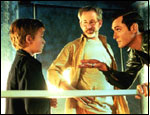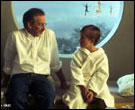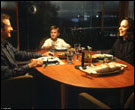Kubrick's cold edge meets Spielberg's warm touch in A I
Amar Parikh
The late director Stanley Kubrick spent years developing a film based on a short story penned by sci-fi writer Brian Aldiss.
 But it never got off the ground because of the limitations of special effects technology at the time and Kubrick's own leisurely shooting habits. Before his death, a determined Kubrick handed over the reins of his dream project to his friend Steven Spielberg.
But it never got off the ground because of the limitations of special effects technology at the time and Kubrick's own leisurely shooting habits. Before his death, a determined Kubrick handed over the reins of his dream project to his friend Steven Spielberg.
So what do you get when you meld Kubrick's cold edge with Spielberg's warm touch? A I. An intense and ambitious film that is as exciting as it's frustrating.
Written and directed by Spielberg, A I is set in a future where the polar ice caps have melted and submerged the world's coastal cities.
'Mechas' or robots have been developed because they don't consume scarce natural resources. But they look, talk and act almost like 'orgas' or humans and perform all the menial chores we would otherwise have had to hire illegal immigrants for.
Meanwhile, Professor Hobby's (William Hurt) secret ambitious project aims to tackle the final frontier of artificial intelligence -- human emotions. They create a robot that is capable of experiencing love.
Henry (Sam Robards) and Monica Swinton (Frances O'Connor), a typically bland suburban couple that so often populate Spielberg's films, are on the verge of losing their only child to an illness.
 They are the chosen receipients of the first robo-child, David (Haley Joel Osment). The instructions make it clear that uttering a certain series of words will irreversibly hardwire the emotion of love into David.
They are the chosen receipients of the first robo-child, David (Haley Joel Osment). The instructions make it clear that uttering a certain series of words will irreversibly hardwire the emotion of love into David.
At first, Monica is uncomfortable around David. But she's starving for the love of a child -- and David's cute smile and limpid eyes finally break her down. She utters the magic words. And David the machine becomes a mama's boy -- obedient and always there with his unconditional love.
Miraculously, the Swintons' real son, Martin (Jake Thomas) recovers and returns home. Sibling rivalry and misunderstandings ensue and the real son wins over the artificial son.
David is abandoned in the woods along with his wise supertoy, Teddy. They soon find that the real world is a cruel place where worn-out and unneeded mechas are hunted down and destroyed to keep their numbers in check.
On the run, David meets a mecha gigolo, Joe (Jude Law) who specialises in satisfying women without asking for so much as a beer in return.
 David's personality begins to take on intriguing shades. He is a mecha, yet just a child who believes that a fairytale character will grant him his wish. Joe and Teddy accompany David on his determined quest to reunite with the mother that abandoned him.
David's personality begins to take on intriguing shades. He is a mecha, yet just a child who believes that a fairytale character will grant him his wish. Joe and Teddy accompany David on his determined quest to reunite with the mother that abandoned him.
Spielberg tries to address some interesting issues. But no matter how well-programmed a machine, can it ever truly feel love? Can a machine pine for a mother? And if a machine can convince us that it feels love, isn't that just manipulation, a stupendous simulation?
Haley Joel Osment (Sixth Sense, Pay It Forward) almost makes us believe. He once again carries a film on his wispy shoulders, imparting increasing empathy to David as his human traits begin to overshadow his mecha roots.
The only time Osment stumbles is when he speaks in hushed tones that seem to channel his Sixth Sense performance.
Jude Law (The Talented Mr Ripley) is outstanding as a sex machine, a stud on demand who, under David's influence, is introduced to the fringes of human emotion -- something that touches him but which he cannot quite comprehend.
Spielberg and his technical crew step up to the challenge of giving shape to the fantastic worlds imagined by Kubrick.
There is a flesh fair where old, battered mechas are destroyed in a carnival-like atmosphere to the delight of a blood-thirsty crowd. Then there is Manhattan -- eerie, desolate and half-submerged in water. And Rouge City -- a neon-lit, futuristic Las Vegas-type sin city.
 The special effects by Industrial Light and Magic are flawless. The movements of Teddy and the mechas look fluid and real and the effects in the scenes where the human fašade drops away to reveal a robotic core are seamlessly executed.
The special effects by Industrial Light and Magic are flawless. The movements of Teddy and the mechas look fluid and real and the effects in the scenes where the human fašade drops away to reveal a robotic core are seamlessly executed.
The final act is a bit of a letdown. There are some weird Oedipal undertones in the long, drawn-out ending. And Kubrick would probably have groaned at Spielberg's trademark sentimental flourishes.
But the field of artificial intelligence throws up so many fine lines and fuzzy boundaries that the mixed feelings this film evokes seem almost appropriate.
A I, the love child of Kubrick and Spielberg, is often precocious and sometimes annoying, but always engaging.